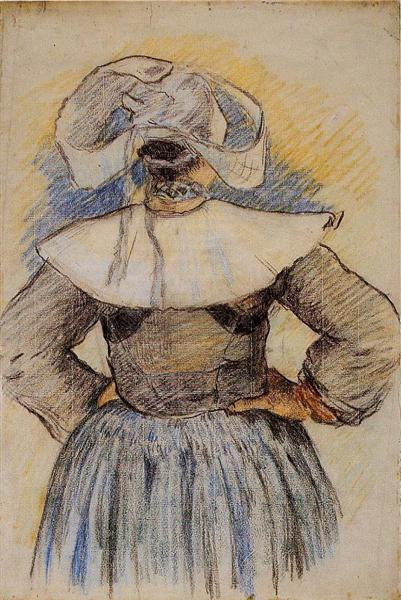Description
Paul Gauguin's painting "Breton Woman" (1886) is one of the most representative works of his exploration of the rural world and the traditions of the people who inhabited the region of Brittany, France. This work denotes a deep interest not only in the female figure, but also in the rich local culture, which at that time was in a process of transition and change. Gauguin, a pioneer of symbolism, sought to express not only the external appearance of his subjects, but also the essence of what they represented.
In “Breton Woman,” Gauguin captures the figure of a woman dressed in traditional regional dress, which features a vibrant and bold color palette. The choice of color is central to this work: the use of intense hues, such as the black and deep blue of the woman’s attire, contrasts with the warm tones of her skin. Gauguin makes use of sharp contours that emphasize the figure, a technique that allows him to give a sense of monumentality to his subject. This approach also coincides with the artist’s interest in the simplification of forms and colors, a hallmark of his increasingly personal style.
The background of the work, a kind of minimalist and almost abstract landscape, emphasises the central figure, creating an aura of isolation that resonates with the feeling of introspection often associated with the female figures in his work. The choice of background and its reduction of detail can be interpreted as a representation of the simple rural life and cultural identity of the Breton woman, elements to which Gauguin felt strongly drawn during his stay in Brittany.
Unlike many of his later works, which feature more exotic influences and complex subject matter, “Breton Woman” exhibits a sense of connection to the land and a reverence for local culture. In his quest to give voice to those he considered relegated to the background in modernity, Gauguin does not simply portray a woman, but evokes the story of a community struggling to be recognized in its uniqueness.
The symbolism inherent in the representation of this woman is not limited to the visual surface; it is an invitation to reflect on the role of women in the social and cultural context of the time. The work, in its simplicity, captures the dialogue between the everyday and the essential, and points to the sovereignty of the female figure in a space that could be considered both intimate and universal.
Paul Gauguin, who later moved to Tahiti, already outlined in this work his interest in non-Western cultures and the Western perceptions surrounding them. His desire to find the primitive and the authentic in artistic representation can be traced in this painting, which is both a tribute and a commentary. While his palette and manner of composition have been the subject of admiration and study, the portrait of "Breton Woman" becomes a microcosm of Gauguin's search for something that transcends the superficial.
Overall, Breton Woman is a remarkable testament to Gauguin's exploration of cultural identity and the female figure, not only representing the reality of a time and place, but also becoming a vehicle for introspection about art and its function in society. His ability to fuse symbolism with a palpable sense of reality is what makes this work a fundamental piece within the canon of modern art.
KUADROS ©, a famous painting on your wall.
Hand-made oil painting reproductions, with the quality of professional artists and the distinctive seal of KUADROS ©.
Painting reproduction service with satisfaction guarantee. If you are not completely satisfied with the replica of your painting, we will refund 100% of your money.

